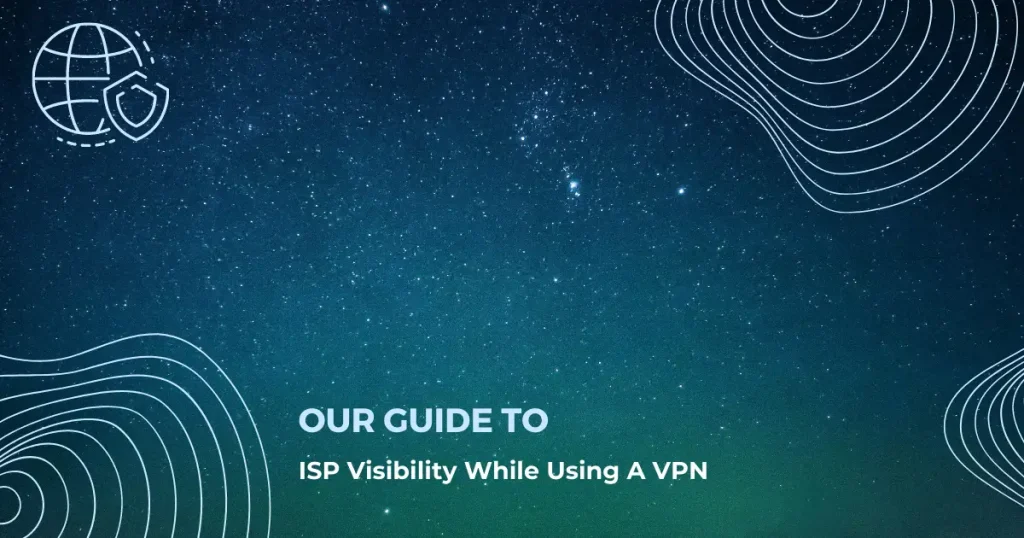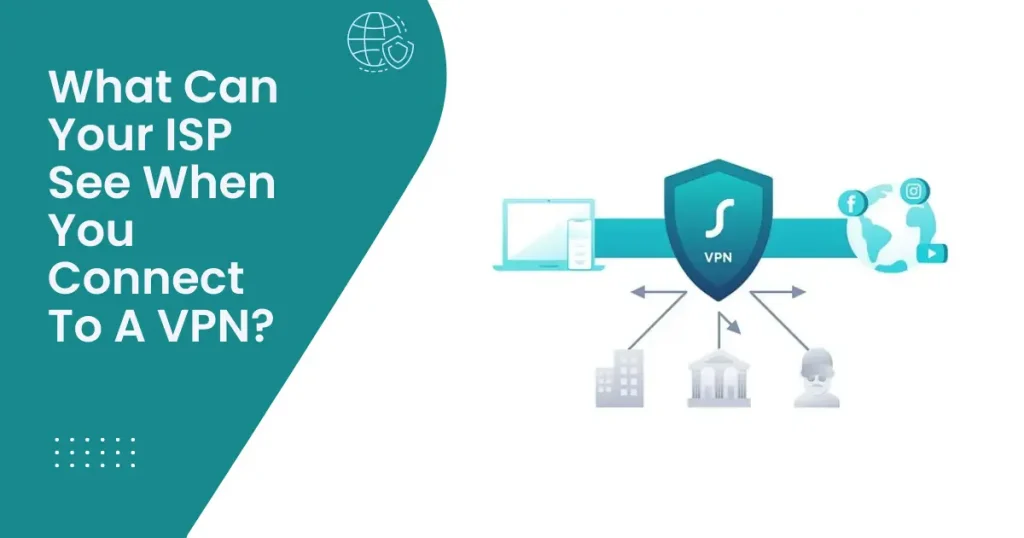
Chris Lawrence is a journalist and chief editor at Wlan Labs. He has been writing about technology for more than ten years. He writes about everything ranging from privacy to open source software. His goal is to educate readers about important topics to help make their lives easier.
Internet service providers (ISPs) routinely monitor and record your online behavior. Data retention rules and regulations allow them to access your information.
When it comes to browsing the web anonymously, a VPN is an excellent choice. However, you may wonder what does my isp see when I use VPN?
What about your downloads, searches, and visits to other web pages? Is it possible for your ISP to monitor your activities when you’re connected to a server? Let’s check whether a VPN can be discovered and what your Internet Service Provider sees when using it.
Can My ISP Track My VPN Use?
Yes, your Internet service provider (ISP) can tell whether you’re using a VPN. Since a VPN bypasses your ISP’s network and instead connects directly to the website you’re looking for, this is the case while using the Internet without a VPN. It’s more sophisticated than that, but it’s good enough for our needs.
You first connect to the VPN service’s server and then to a specific web address when you use a VPN. Your IP address is changed to match the IP of the VPN server, giving the impression to the site that you are a different person, someplace else.
You should be aware that you might still be easily tracked down even with incognito mode turned off.

Is The Internet Service Provider (ISP) Able To View VPN Traffic?
There is no way for an Internet service provider (ISP) to hide VPN traffic. For this reason, an encrypted connection may only be used using a virtual private network (VPN).
IP address, VPN Protocol, and Port number are all indicators of utilizing a virtual private network (VPN). Internet Service Providers may potentially use deep Packet Inspection (DPI) to identify VPN activity.
Here’s how your ISP can see your VPN:
VPN IP Address
By looking at its IP address, it’s simple to detect whether a server you’re connected to belongs to a VPN service.
Port Number
You connect to a specific port by looking at the Port Number set by a VPN protocol.
Aware of the Virtual Private Network Protocol
If you utilize a different port, the VPN protocol encrypts your communications, which might be another sign.
DPI
Analyzing VPN traffic using DPI is a sophisticated method used by most high-tech Internet service providers.
Can ISP See When You Use a VPN? Video
Using A VPN, Can My ISP See What I’m Downloading?
The ISP cannot see what you download when you use a VPN. It can’t know what is going on within the VPN tunnel. There is no way for your Internet service provider (ISP) to know what files you download or where they came from.
A VPN is a must-have for the safety of both you and the data you exchange. An ISP can only see encrypted data streams.
When I Use A VPN, Can ISP Track The Websites I Visit?
ISPs cannot see the websites you visit using a virtual private network. All of your interactions with the websites you visit are done so anonymously.
When you use a virtual private network, your Internet service provider (ISP) does not know where you are browsing. Only the hours and bandwidth utilized while connecting to a VPN server’s IP address may be seen by your ISP.
Does VPN Hide History From Router?
A VPN, or Virtual Private Network, is a tool that creates an encrypted tunnel between your device and the internet. This tunnel allows you to browse the web privately and securely, hiding your activity from your ISP, government, and anyone else who might be snooping.
But does a VPN hide your browsing history from your router? The answer is… it depends. If you’re using a VPN that doesn’t keep logs of your activity, then yes, your browsing history will be hidden from your router.
But if you’re using a VPN that does keep logs, then your browsing history could still be exposed to your router (and anyone else who has access to those logs).
Is It Possible For Your ISP To Track Your VPN Activity?
When you use a VPN, your Internet service provider (ISP) cannot see what you are looking for online. You may still be tracked by the search engine you’re using.
It is possible to conceal your search history from your Internet service provider (ISP), but not from Google or Bing. Extra precautions are required if you want to safeguard your browsing and search history.
Can VPN Be Tracked By The Government?
Yes, VPNs can be tracked by governments. However, the extent to which they can be tracked depends on several factors, including the type of VPN you are using and the government’s level of sophistication.
For example, if you use a free VPN service that doesn’t encrypt your traffic, it will be pretty easy for your government to track your online activity.
On the other hand, if you use a more sophisticated VPN service that encrypts your traffic and uses advanced security features, it will be much more difficult for your government to track your activity.
In any case, it is essential to remember that even the most secure VPN is not entirely anonymous, and there is always a risk that your activities could be traced.
Is Your Internet Service Provider Concerned That You Use A VPN?
The answer is likely dependent on where you live. We may presume that Internet service providers (ISPs) don’t care in the vast majority of countries. It doesn’t matter whether you connect to a VPN’s server or a random site.
As a result, many individuals utilize VPNs to access work networks from home. An encrypted virtual private network (VPN) is essentially the same.
There is one major exception to this rule: nations with dictatorships like China, Iran, and a slew of others have banned the use of VPNs.
Many Internet service providers (ISPs) in these nations are either state-owned or subject to governmental control, which means that connections may be monitored.
There are allegations that the Chinese government has created VPN-tracking technology, and we know that the Chinese authorities will enforce penalties on VPN usage.
Even if these programs can collect information on which connections return encrypted data and identify them, we can only assume.
Why Is It Important To Consider Setting Up A VPN?
Can VPN provider see my data?
People often ask, can a VPN provider see my data? A virtual private network (VPN) encrypts your internet traffic and prevents your Internet service provider (ISP) from monitoring your online activity. Even while your Internet service provider (ISP) records most of your Internet traffic, it does capture specific data.
When you utilize a virtual private network, your ISP only sees the following:
- VPN Protocol
- A virtual private network (VPN) server’s IP address
- Authenticated IP address
- The timestamps of the connections.
- Amount of encrypted data being sent
Why Does Your ISP Still Have Access To Certain Information?
Your internet service provider links you to the websites you wish to browse. Data packets are sent to the ISP, and the ISP forwards them to their intended recipient.
You instruct the VPN client to communicate with the VPN server on your behalf whenever you connect to a VPN. After that, the VPN server takes control, and the ISP will have no idea where the package ends.
Best VPN To Hide From ISP?
There are a number of different VPNs that people can use in order to hide their activities from their ISP. However, not all of these VPNs are created equal, and some are better than others at hiding user activity.
Some of the best VPNs for hiding user activity from an ISP include NordVPN, ExpressVPN, and Private Internet Access. These VPNs are known for being able to conceal user traffic and keep it hidden from the prying eyes of ISPs. They also offer a variety of other features that can be useful for people who want to keep their activities private.
What About VPN Alternatives LikeDuckDuckGo?
DuckDuckGo is a search engine that offers enhanced online privacy and security features. While it is not a full-fledged VPN service, it provides some benefits similar to those offered by VPNs.
For example, DuckDuckGo can help hide your IP address from websites you visit and encrypt your traffic to make it more difficult for third parties to track your online activity.
DuckDuckGo offers several other privacy-focused features, such as preventing third-party sites from tracking you and blocking advertising cookies.
While DuckDuckGo is not a perfect substitute for a VPN, it can offer some added privacy and security advantages.
Can My ISP See What I Download With VPN Conclusion
A VPN, or Virtual Private Network, is a tool that creates an encrypted tunnel between your device and the internet. This tunnel allows you to browse the web privately and securely, hiding your activity from your ISP, government, and anyone else who might be snooping.
So can my isp see what I download with VPN? Your Internet service provider (ISP) can observe your VPN traffic. It’s not hard to identify whether the IP address you’re connected to belongs to a VPN service provider. On the other hand, your ISP only sees the connections flowing to a VPN server and not the websites you access.
A virtual private network (VPN) encrypts your internet traffic. Each of these protocols connects to a single port and uses extensive encryption to protect data. By looking at the port number, you may also determine which VPN protocol was utilized.
When you use a virtual private network (VPN), your real identity and location are hidden only from the websites you visit, not from your ISP. Your Internet service provider (ISP) knows your actual IP address. It also knows when and for how long you connect to the Internet.
The Internet service provider (ISP) may also monitor data transmission and bandwidth use. This information is likely incorrect since your downloads and browsing activities are muddled together. Additional overhead and data distortion are caused by VPN encryption.
If your Internet service provider (ISP) chooses to spy on you, it can’t. Only the encrypted gibberish data stream may be seen over a virtual private network (VPN). The encryption techniques employed by VPNs are impossible to break; therefore, your data remains safe.

